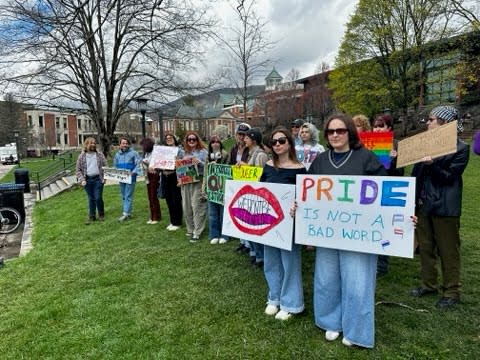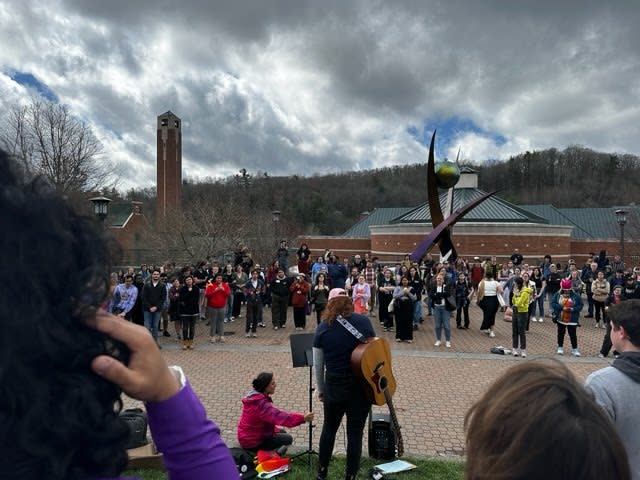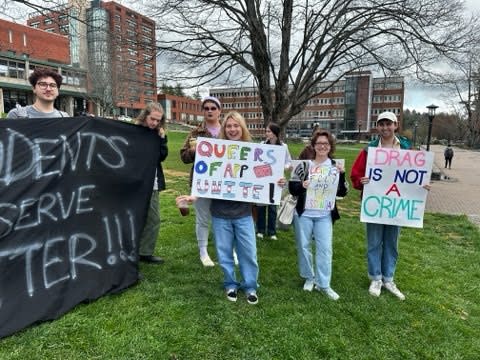Appalachian State University: After "Pride Week" Name Change, LGBTQ+ Staff Firings, Students Fear Suppression

Carlos M. Saavedra/Getty Images
This was supposed to be Appalachian State University’s annual Pride Week. The North Carolina public university’s Pride Week — which typically takes place in April, hosted by the school’s LGBTQ+ Center — usually consists of panels, art galleries and socials that celebrate and affirm queer and trans identity.
Instead, students say the program was rebranded, omitting “Pride” from the title. Some students on campus say they fear it’s a form of queer suppression on campus — and a threat of things to come. The concerns come amid a surge of anti-DEI bills targeting universities in red states, as well as other issues related to Appalachian State’s LGBTQ+ community, including the cancelation of a Drag Trivia event and the firing of four LGBTQ+ university employees. School leaders say the events are unrelated, but the timing leaves students wary.
“My disgust comes from [school leaders] giving up before they have to,” Evan Foster, a gay rising junior studying public health at Appalachian State, told Teen Vogue. Foster believes Pride Week’s name change and lack of drag inclusion comes from a place of school administration proactively responding to anti-DEI legislation in North Carolina.
School leaders say the rebrand, drag trivia event, and employees being fired are unrelated, but the timing leaves some students wary.
While new information — following questions from Teen Vogue and other news outlets — has brought some clarity to the situation, students say they still want transparency directly from school leaders.
A new name sparks concerns among students
This year’s Pride celebration was scheduled for April 1 through 6. But in the weeks leading up to the event, the Henderson Springs LGBTQ+ Center began promoting this year’s celebration as “Spring Fest.”
“Spring Fest” is described in part as a week of “events designed to educate, empower, and unite Mountaineers of all identities, especially our LGBTQ+ community of App State.” In interviews with Teen Vogue, school leaders maintained that the school’s LGBTQ+ Center presented the name and itinerary, but declined to go into specifics. Some students say the new name reads like a form of pandering to state pressures.
In a statement responding to the backlash over the new name published on social media by the school LGBTQ+ Center, the office stated its “commitment” to support the school’s queer community “is strong” and that “the center is fully operational.” (In a petition launched March 21, some students allege the center isn’t appropriately staffed.) “Spring Fest 2024 is a celebration of the vibrant uniqueness within the Queer community,” the center’s statement said. “Throughout the weeklong programming, we aim to create inclusive spaces where every identity is celebrated.” A spokesperson for the school’s LGBTQ+ Center did not respond to Teen Vogue’s request for comment.
The social media statement from the LGBTQ+ Center did not directly address the event’s new name. In the comment section, students criticized the Spring Fest name and implored fellow students to keep calling it “Pride Fest.”
Student leaders involved with the school’s College Democrats, as well as the Student Government and Graduate Student Government Association, claim the new name was a direct order from school administrators and happened without consulting them.
The school administration says the new name came from “members of the university community,” though specifics weren’t mentioned. “We are continually seeking ways to develop and foster a campus environment in which all members of our campus community feel supported and can thrive,” Appalachian State spokesperson Megan Hayes told Teen Vogue. “Language and terminology are important, and at App State, we strive to use language that is supportive for multiple populations of our campus community we serve in order to fulfill our mission and strategic plan.”
Some students also claim a previously scheduled Drag Trivia event was canceled by administration, stirring up concerns when coupled with the name change and employee terminations. Graduate Student Government Association leaders condemned the university’s recent firing of staff members who were also members of the university’s Queer & Trans Staff and Faculty, a support group for LGBTQ+ staff and faculty members at Appalachian State.
Hayes told Teen Vogue the drag trivia event was separate from Spring Fest to begin with (initially scheduled for April 18) and wasn’t shut down by the administration. “There was no orchestrated effort to remove a drag show from Spring Fest,” Hayes said. Regarding the fired employees, Hayes denied any efforts to fire employees that identify as LGBTQ+ to Inside Higher Ed.
As of publication time, the university has not released a public statement about Spring Fest, student pushback about the name, or other concerns regarding the LGBTQ+ community. On Tuesday evening, the school’s vice chancellor of student affairs said in an email to students that Spring Fest was meant to affirm the LGBTQ+ community and school officials would take feedback on the name into account for next year.
“They sent this knowing they had over a week between when this news broke and this week, pride week, to reverse their decision,” Foster said.
Students begin speaking out
Within days of Spring Fest promotions beginning, Appalachian State’s Graduate Student Government Association unanimously passed a resolution denouncing the school’s “lack of support” for the LGBTQ+ community, and committing to celebrating Pride Week, not “Spring Fest.”
“Pride Week sends a powerful message that the university is committed (not just performatively, but in actuality) to diversity, inclusion, and social justice,” the resolution said. “It is vital and demonstrates dedication to creating a safe and supportive campus environment where every student can thrive academically, socially, and personally.” The student leaders added that by renaming Pride Week “Spring Fest,” the school was “hiding or even denouncing” support for its LGBTQ+ community.
Student leaders with the Appalachian State College Democrats also released a statement last week criticizing Spring Fest’s new name, calling it an “assault” on freedom of speech and expression.
In a statement from Appalachian State’s Student Government Association, student leaders acknowledged that rebranding the event came as a “double-edged sword.”
“For some students, these events were the first spaces where their identities were validated … Renaming them removes some of the representation found in these spaces,” the SGA statement said. “Simultaneously, the rebranding was done to protect these same students from harsh and triggering environments.”
The SGA goes on to say that the burden shouldn’t be on students to communicate changes occurring within school clubs and organizations. “The Student Government Association believes that recent events on campus demonstrate a need for increased transparency on behalf of the University regarding policy changes and a need to ensure that individuals have a comprehensive understanding of what decisions are being made and why,” the statement said.
Now, as the week of events is underway, groups including the Appalachian State College Democrats are hosting counter-programming and rallies to uplift the school’s queer community. It comes as, across the country, anti-DEI bills are surging in states with Republican lawmakers in charge, largely targeting public colleges.
On Wednesday April 3, dozens of students gathered on a campus lawn — some armed with signs that said things like “PRIDE is not a bad word” — in solidarity. Students, including Foster, spoke.
“I feel silenced,” Foster said in his speech. “We feel silenced. This is what the university I chose to go to has decided. I came here particularly for the queer community. I came here because I believed I belonged.”




Anti-DEI laws surge across the country
According to the Chronicle of Higher Education, at least 82 bills threatening to roll back DEI efforts and trainings at colleges have been introduced since last year in more than two dozen states. At least 12 have become law. In some cases, there are reports of schools issuing changes to their respective DEI departments and initiatives in anticipation of new laws — before they even take effect. In Florida, state universities shuttered their DEI programs and fired the departments’ respective employees as a result of anti-DEI laws. Similar laws also took effect in North Dakota, Utah, and Tennessee in recent years.
As noted by the National Education Association, the bills are directly impacting students of color, LGBTQ+ students and campus LGBTQ+ centers. The populations targeted by the anti-DEI bills — students of color and LGBTQ+ students — continue to need additional support on campus when it comes to feeling prepared and adequately supported, both mentally and financially, for a college career.
Still, Hayes, the Appalachian State spokesperson, told Teen Vogue there is “no connection” between this year’s “Spring Fest” and North Carolina’s new anti-DEI law, which took effect in December. The existing law focuses on state agency (including university) employment, but doesn’t censor events on campus. But it comes at a time where DEI remains under scrutiny in North Carolina and beyond.
Hayes says university officials are listening to student feedback and taking it into consideration for next year. “After outside parties launched a call on social media asking alumni to register their concerns, we began to hear from alumni and students … related to this year’s title for the event series,” Hayes said. “We are having ongoing conversations with students regarding this week’s programming, the planning process and the naming process. We will take the feedback we’ve received so far, as well as what comes from these discussions, and incorporate it into our planning for next year’s event.”
Experts say the language for most of the anti-DEI bills is “intentionally vague,” causing challenges regarding how schools interpret the laws and how others perceive them. They also predict that more laws targeting DEI could be on the way.
On campus, students say they’re concerned last week’s string of events are connected and provide a preview of potential censorship threats amplified by state legislation.
“It’s been a rough week,” Foster said. “I feel less welcome on campus. I know my other queer friends feel the same.”
Stay up-to-date with the politics team. Sign up for the Teen Vogue Take
Originally Appeared on Teen Vogue
Want to read more Teen Vogue LGBTQ coverage?

